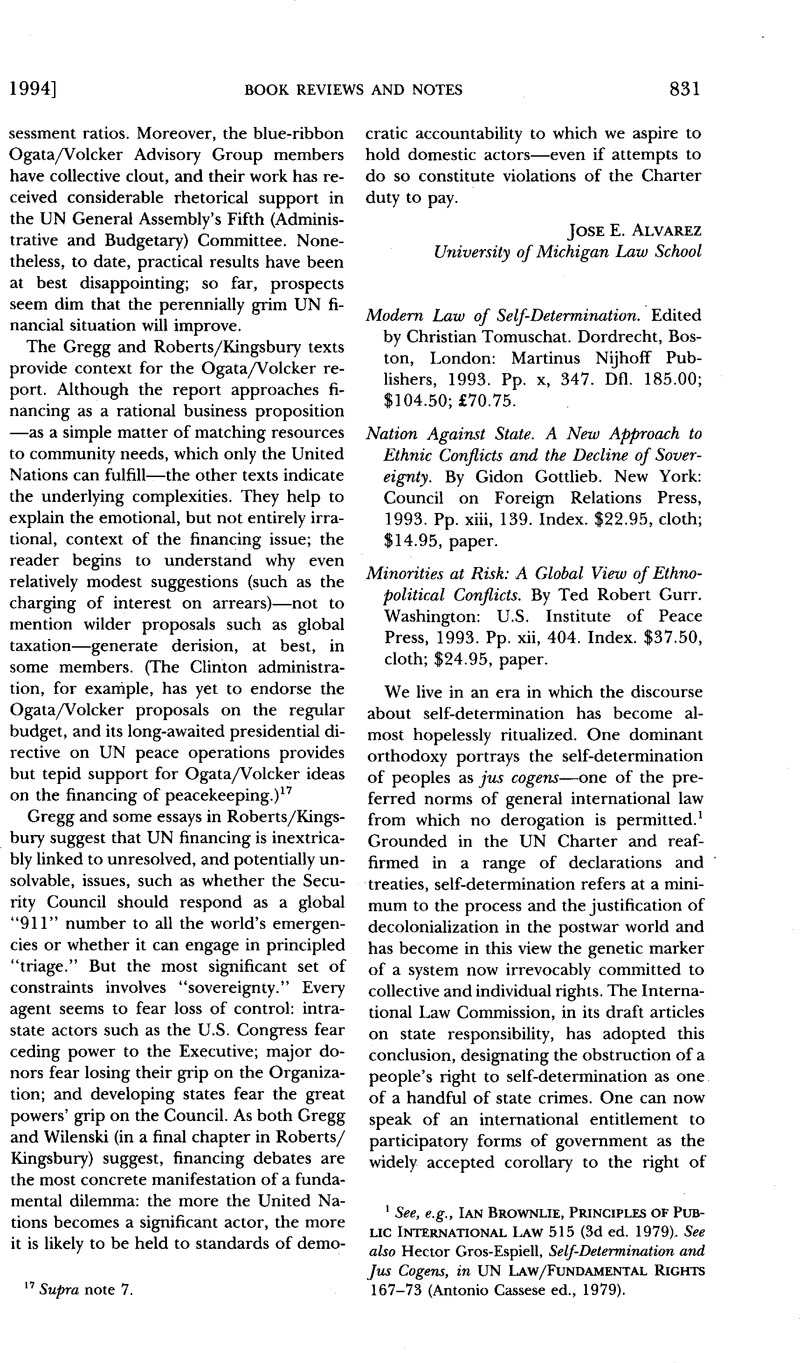Published online by Cambridge University Press: 27 February 2017

1 See, e.g., Ian Brownlie, Principles of Public International Law 515 (3d ed. 1979), See also Hector Gros-Espiell, Self-Determination and Jus Cogens, in UN Law/Fundamental Rights 167–73 (Antonio Cassese ed., 1979).
2 See, e.g., 1 J. H. W. Verzijl, International Law in Historical Perspective 325 (1968); Vernon Van Dyke, Self-Determination and Minority Rights, 13 Int’l Stud. Q. 223, 223 (1969) (self-determination is “a shibboleth that all pronounce to identify themselves with the virtuous”). Cf. Hurst Hannum, Autonomy, Sovereignty, and Self-Determination: The Accommodation of Conflicting Rights 49 (1990) (self-determination is a profoundly limited legal right but a political principle of considerable power); W. Michael Reisman, Coercion and Self-Determination: Construing Charter Article 2(4), 78 AJIL 642, 643 (1984) (self-determination is the “key postulate of political legitimacy in the 20th century”).
3 J. Milton Yinger, Intersecting Strands in the Theorisation of Race and Ethnic Relations, in Theories of Race and Ethnic Relations 20 (J. Rex & D. Mason eds., 1986).
4 Essays were submitted by Christian Tomuschat, Dietrich Murswiek, Gudmundur Alfredsson, Douglas Sanders, Otto Kimminich, Patrick Thornberry, Asbjørn Eide, Philip Allott, Jochen A. Frowein, Allan Rosas and Jean Salmon.
5 See The Right to Self-Determination, Implementation of United Nations Resolutions, UN Doc. E/CN.4/Sub.2/405/Rev.1, para. 90 (1980) (Hector Gros-Espiell, Special Rapporteur): (“The express acceptance in … [various UN resolutions] of the principles of the national unity and the territorial integrity of the State implies non-recognition of the right of secession.”).
6 See Dietrich Murswiek, The Issue of Secession—Reconsidered (pp. 20–39), and Jochen A. Frowein, Self-Determination as a Limit to Obligations under International Law (pp. 211–23).
7 See, e.g., Gudmundur Alfredsson, The Right of Self-Determination and Indigenous Peoples (pp. 41–54), and Douglas Sanders, Self-Determination and Indigenous Peoples (pp. 55–81).
8 See, e.g., Otto Kimminich, A “Federal‘ Right of Self-Determination (pp. 83–100); Allan Rosas, Internal Self-Determination (pp. 225–52); Jean Salmon, Internal Aspects of the Right to Self-Determination: Toward a Democratic Legitimacy Principle? (pp. 253–82).
9 See Philip Allott, Self-Determination—Absolute Right or Social Poetry? (pp. 177–210).
10 See, e.g., Atle Grahl-Madsen, Introduction, 55 Nord. J. Int’l L. 2, 7–11 (1986). Cf. Alfred Cobban, The Nation-State and National Self-Determination 42–43 (1969) (“The history of self-determination is a history of the making of nations and the breaking of states.”).
11 For an early version of the argument that nationality, not territoriality, should be the basis for resolving conflicts of laws, see Pasquale Stan-islao Mancini, Delia nazionalità come fondamento del diritto delle gente (1851), reprinted in Pasquale Mancini, Diritto Internazionale, Prelezioni 1 (1873).
12 Monty G. Marshall, States at Risk: Ethnopolitics in the Multinational States of Eastern Europe; Barbara Harff, Minorities, Rebellion, and Repression in North Africa and the Middle East; and James R. Scarritt, Communal Conflict and Contention for Power in Africa South of the Sahara.
13 Gurr labors to bring empirical confirmation to some generalizations that do not seem to need it: “Groups that won out in conquest, state building, and economic development established patterns of authority and various kinds of social barriers to protect their advantages, including the policies and practices for which we use the shorthand label ‘discrimination’” (p. 36). “The extent of a communal group’s collective disadvantages vis-a-vis other groups is a principal source of its members’ grievances and perceptions that they have a common interest in collective action” (p. 126).
14 See Albert Hirschman, Exit, Voice, and Loyalty: Responses to Decline in Firms, Organizations, and States (1970).